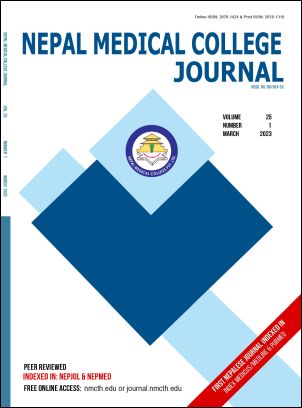Assessment of factors influencing operating time during retrograde intrarenal surgery for renal stone in tertiary care hospital of Nepal
DOI:
https://doi.org/10.3126/nmcj.v25i1.53364Keywords:
Renal stone, retrograde intrarenal surgery (RIRS), operating timeAbstract
Retrograde intrarenal surgery (RIRS) is an effective and safe method for the management of intrarenal stone showing high stone-free rates. Its main advantage is decrease in operative morbidity for the patient, as well as a faster recovery. The current study aimed to study the factors influencing operating time during retrograde intrarenal surgery for renal stone in tertiary care hospital. It is an observational descriptive cross sectional study using purposive sampling method which was conducted among 188 patients who underwent retrograde intrarenal surgery (RIRS) for management of nephrolithiasis in Department of Urology of B&B hospital, Lalitpur, Nepal. The baseline information of the factors affecting operating time were obtained like age, gender, site of renal stone, prestented or not, body mass index (BMI), ureteral access sheath (UAS) use, stone volume and stone density. The mean operating time was high in renal stone with calcium ammonium urate composition. On linear regression analysis, operative times significantly increased with greater stone volumes and also pre-stenting and ureteral access sheath use did significantly difference on operative time. It revealed stone volume to be the most significant predictor of operative time. Thus, the present study provides valuable information regarding the factors influencing operating time during retrograde intrarenal surgery for renal stone.
Downloads
Downloads
Published
How to Cite
Issue
Section
License
Copyright (c) 2023 Nepal Medical College Journal

This work is licensed under a Creative Commons Attribution 4.0 International License.
This license enables reusers to distribute, remix, adapt, and build upon the material in any medium or format, so long as attribution is given to the creator. The license allows for commercial use.




